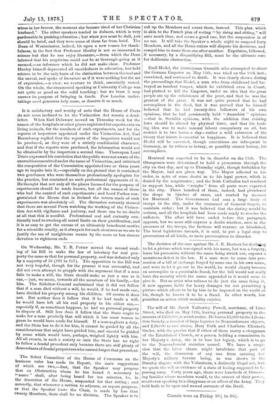On Wednesday, Mr. T. B. Potter moved the second read-
ing of his Bill to make the law of intestacy for real pro- perty the same as that for personal property, and was defeated only by a majority of 36 (193 to 157). The opposition to the Bill was not very hopeful, though for the present it was successful, and did not even attempt to grapple with the argument that if a man fails to make a will, the State should make as just a one as it can,—just, we mean, towards all the members of his family,—for him. The Solicitor-General maintained that it did not follow that if a man died without a will, he would, if he had made one, have divided his property among his children. Of course it does not. But neither does it follow that if he had made a will, he would have left all his real property to his eldest son,— especially if, as sometimes happens, he had no personal property to dispose of. Still less does it follow that the State ought to make for a man precisely that will which it has most reason to guess he would have made for himself. If a man neglects a duty, and the State has to do it for him, it cannot be guided by all the considerations that might have guided him, and should be guided by some which would have, perhaps, weighed lightly with him. All all events, in such a society as ours the State has no right to follow a feudal precedent only because there are still plenty of descendants of feudal proprietors who cannot forget that precedent.


































 Previous page
Previous page